The US is considering downgrading Thailand on a human trafficking blacklist, following revelations in the Guardian that slaves are being used in the production of prawns sold in leading American, British and European supermarkets.
Washington will directly address allegations of human trafficking in Thailand's trade in prawns – known in the US as shrimp – in an imminent report that could result in economic sanctions against Bangkok. The state department has confirmed it intends to review the country's response to abuses such as migrants being bought by shipowners and forced to work as slaves for years at sea without pay.
The review, expected in the middle of this month, could result in Thailand being downgraded to the lowest level in a US system that ranks 188 nations according to their willingness and efforts to combat slavery and human trafficking. A relegation to tier three could trigger economic sanctions and loss of development aid, although such punishments can be waived under certain national security considerations.
"We are aware of the Guardian investigation," said Luis CdeBaca, Washington's Ambassador-at-Large for monitoring and combatting trafficking in persons, in a statement.
"We are currently finalising the 2014 Trafficking in Persons report, which will be released later this month, and will include an overview of human trafficking in Thailand and the Thai government's efforts to address human trafficking."
The annual Trafficking in Persons (TiP) report is considered to be the gold standard in global anti-trafficking efforts. Last year Thailand narrowly escaped relegation for the third year running and was told it would face an automatic downgrade this year if significant progress was not made to address issues of slavery and trafficking within its borders by the end of the year.
Last year, for the third year running, Thailand narrowly escaped relegation and was told it would face an automatic downgrade this year if significant progress was not made to address issues of slavery and trafficking within its borders by the end of the year.
"Under US law there is a time limit how many years a country can stay on the tier-2 watch list before it is automatically downgraded to tier 3," said former US trafficking ambassador Mark Lagon, now a professor at Georgetown University.
"If the US government determines that Thailand has made improvements it can be raised up, but if it has not, there is no longer an opportunity to have any waivers or delay."
Lagon said Thailand was at a "critical juncture" with the annual report due to be released within days and the country facing international "moral opprobrium" for receiving the lowest possible ranking.
He also paid tribute to The Guardian's six month investigation into the Thai fishing industry, which uncovered horrific conditions, 20-hour shifts, regular beatings, torture and execution-style killings.
Fifteen migrant workers from Burma and Cambodia described to the Guardian how they had been enslaved, after paying brokers to help them find work in Thailand in factories or on building sites. They were sold instead to boat captains, sometimes for as little as $420 (£250).
"As important as the work of governments and the UN are revelations brought to light by journalists," said Lagon. "They do affect governments: creditworthiness, commerce, trust in the seafood coming out of Thailand will all be affected by this."
Although slavery is illegal everywhere in the world, including Thailand, the south-east Asian country is considered a major source, transit and destination country for slavery, where nearly half a million people are believed to be enslaved, according to the Global Slavery Index.
A tier-3 ranking would rank Thailand alongside Iran, North Korea and Saudi Arabia for categorically failing to comply with the most basic international requirements to prevent trafficking and protect victims.
A downgrade could also lead to restrictions on US foreign assistance and access to global institutions such as the World Bank and International Monetary Fund.
This week's Guardian investigation uncovered slavery in the supply chains of farmed shrimp sold by major UK, US and European supermarkets and retailers, including Walmart, Carrefour, Costco, Tesco, Aldi, Coop, Morrisons and Iceland.
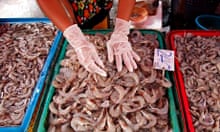
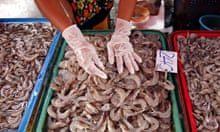

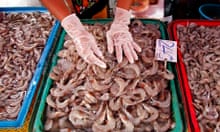
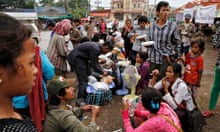
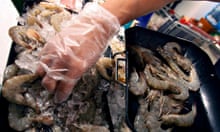

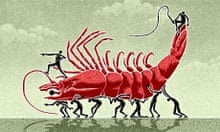

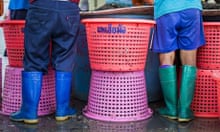
Comments (…)
Sign in or create your Guardian account to join the discussion